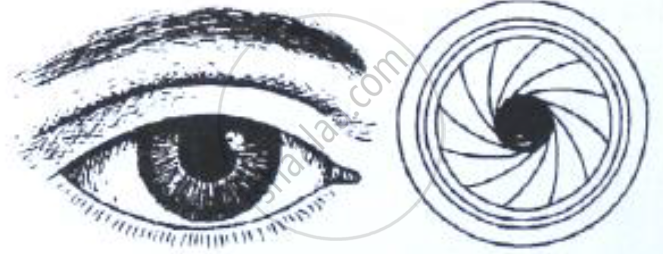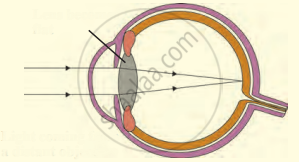Advertisements
Advertisements
प्रश्न
The figure below compares a part of our eye with a part of a photographic camera.

Name the corresponding parts of the eye the camera shown here that are comparable in function.
उत्तर
Cornea is comparable to the lens cover of the camera. The iris and pupil act like the aperture of a camera.
APPEARS IN
संबंधित प्रश्न
Write the function of the following part of the human eye: crystalline lens
Differentiate between: Rods and cones
What changes the shape of lens in the eye?
What is the range of vision of a normal human eye?
Give the scientific names of the following parts of the eye:
a clear window at the front of the eye.
What happens to the size of pupil of our eye (i) in dim light (ii) in bright light?
The term " accommodation" as applied to the eye, refers to its ability to:
(a) control the light intensity falling on the retina
(b) erect the inverted image formed on the retina
(c) vary the focal length of the lens
(d) vary the distance between the lens and retina
Which of the following changes occur when you walk out of bright sunshine into a poorly lit room?
(a) the pupil becomes larger
(b) the lens becomes thicker
(c) the ciliary muscle relaxes
(d) the pupil becomes smaller
Give scientific reason:
We cannot clearly see an object kept at a distance less than 25 cm from the eye.
State the main functions of the following:
Coronary Artery
Name the following:
Yellow spot and ciliary muscles are found in.
Mention, if the following statement is True or False
The least distance of distinct vision for the human eye is 25 cm
Choose the Odd One Out:
The following figure show the change in the shape of the lens while seeing distant and nearby objects. Complete the figures by correctly labelling the diagram.

A person cannot see distinctly objects kept beyond 2 m. This defect can be corrected by using a lens of power
Vitreous humour is present between ______.
Match the following:
|
Column - I |
Column - II | ||
| 1 | Retina | a | Path way of light |
| 2 | Pupil | b |
far point comes closer |
| 3 | Ciliary muscles | c |
near point moves away |
| 4 | Myopia | d | Screen of the eye |
| 5 | Hypermetropia | e | Power of accommodation |
Match the terms in column I with those in column II and write down the matching pairs.
| Column I | Column II | ||
| (i) | Conjunctiva | (a) | Viral infection |
| (ii) | Cornea | (b) | Ciliary body |
| (iii) | Choroid | (c) | Spiral-shaped |
| (iv) | Cochlea | (d) | Transparent epithelium |
| (v) | Conjunctivitis | (e) | Suspensory ligament |
| (f) | Contains melanin | ||
| (g) | Transparent but appears black |
Name the following:
Two pigments of the sensory cells.
With reference to human eye answer the question that follow:
Name the part of the eye associated with the regulation of the shape of lens.
